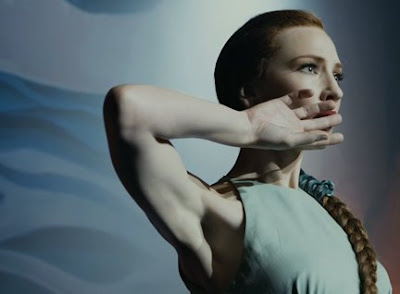1.5 stars (out of 5)
By R. Kurt Osenlund
Someone told me recently that I complain too much about movies lacking originality, to which I offered a rebuttal that has itself become a cliché, at least among critics: “There's a devastating shortage of inventiveness in Hollywood.” I hope my accuser – who simply shrugged at my response – is reading this review, because my complaints are about to blast through the roof. “New in Town,” the latest time-waster to show off Renee Zellweger's poor acting skills and freakish visage, is the most unabashedly unoriginal film I've seen in years. Its wholly derivative fabric – which, from rising action to climax, may well have been copied straight out of a textbook on standard script formats – is a quilted pattern of elements that stumble from unwatchable to cheaply charming to totally trite. Exploiting the same old story of a big city girl who finds love and self-fulfillment in a small town, the movie's alternate title could easily be “Sweet Home Minnesota.”

Comparisons to 2002's Reese Witherspoon rom-com are inevitable, especially since both “New in Town” and “Sweet Home Alabama” were written by C. Jay Cox (who here shares screenwriting credits with a fella named Ken Rance). One foundational difference between these two titles is that Witherspoon is likeable and Zellweger is not. However typical your movie may be, throw in a charismatic star and the result can be transcendent. Throw in Zellweger and you've got lemon juice on a wound. Anyone who watched this year's Golden Globe Awards can concur that this woman is surely turning into some type of alien, her zipper-tight pursed lips engulfed by a face that's endured one too many “Bridget Jones” fluctuations. But it's unfair to judge Zellweger solely on her progressively strange appearance; after all, it's the insincerity of her performances that leaves the viewer feeling detached.
In “New in Town,” she plays Lucy Hill, an enterprising, soon-to-be corporate executive living the high life in Miami. We meet her in the midst of her busy day-to-day routine via over-emphasized shots of stilettos, sports cars, and Starbucks cups. Scurrying awkwardly from scene to scene, Zellweger does about as much to convince us that she's a high-powered glamazon as Alicia Silverstone did to make us buy her as a superhero in “Batman & Robin” – she can't even walk the walk. When Lucy volunteers to whip a small, under-performing company factory into shape, the attempt to advance her career becomes a nightmare of privileged female discomfort. She hops a plane to a one-horse Minnesota town with a year's worth of luggage in tow. She braves the cold, inexplicably packs her mountain of Louis Vuitton bags into a rented mid-size sedan, rolls on to her destination, and whines a lot. When she meets the chipper, simple townspeople who talk openly about pets and Jesus, Lucy can't relate, and Zellweger plays the character's disconnect by staring blankly into the distance and making snide remarks. The painful-to-view first act is capped off by a surprisingly mean-spirited scene in which Lucy, after being invited to dinner by one of the natives, promptly insults an entire roomful of strangers. The ill-conceived bit is meant to establish a strong romantic rivalry between Lucy and Ted, the local union rep. played adequately by Harry Connick Jr., but instead takes the story from stale to sour.

Lucy, of course, begins to warm up to the chilly little community. She befriends the ladies she first saw as subordinate, finds merit in the factory workers she was sent to lay off, and falls for Ted, who was thankfully the only other soul around when she stranded herself in a snow bank in the middle of nowhere. When Lucy learns that corporate wants to shut down the factory, she predictably embarks on a quest to save it, commencing the use of a handful of pop songs that tell us how to feel. None of the plot developments are believable – not for a second. It's unclear how much time passes before Lucy comes around, but her conversion from bullheaded outsider to appreciative guest seems to happen in a blink. After a few homemade gifts and one down-home holiday carol sing, she's on board with the simple life, trading the use of big words like “mechanization” and “dialoguing” for the acceptance of Midwestern banter like “patootie” and “don't cha know?” And there's one post-makeover reveal involving Ted's teenage daughter that's so overused, it's even been spoofed in those repellent “Movie” movies. Cox, Rance, and director Jonas Elmer had to have known this going in.
The same someone who called me out on my frequent gripes about the biz accompanied me to “New in Town” and told me it's the kind of movie that everyone wants to see made every year, over and over. “If that's true,” I replied, still coated in Obama inauguration afterglow, “then a little slice of my newly restored hope for this country just died.” That may sound a little extreme in regards to a seemingly harmless romantic comedy, but such overtly uninspired refuse can't really be what all those smart folks who elected the right president are seeking for entertainment – can it? All I know is, the last scene in this film shows a supporting character receiving a check for more money than she's probably ever seen in her life. I gave her to the count of three to faint. She keeled over at the count of two. There was a sea of laughter in the theater. Yikes.







